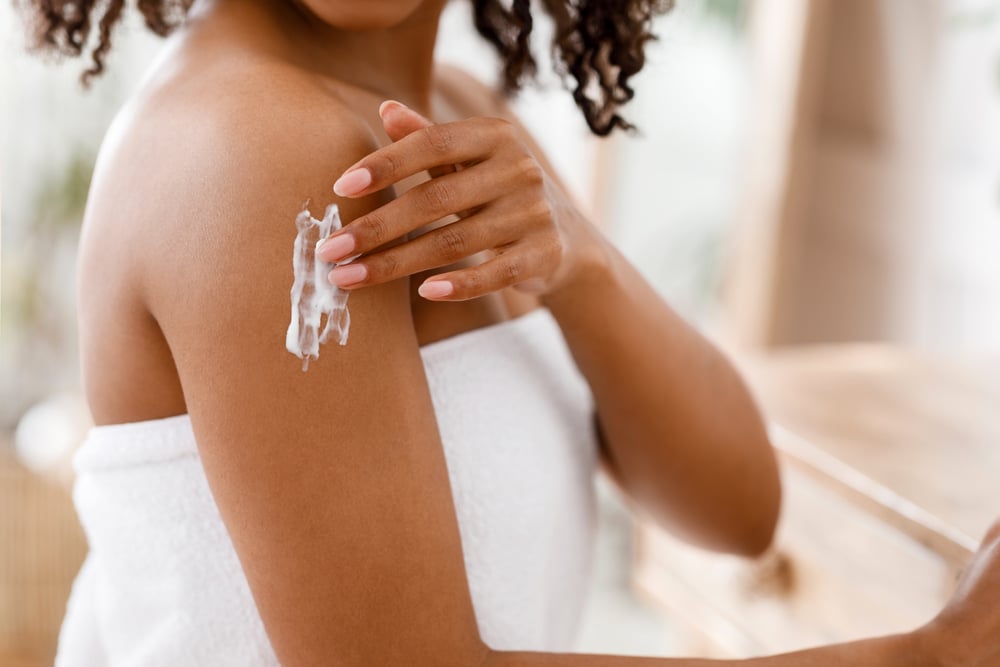Hyperpigmentation is a term used in the skin care world to describe darkened areas on your skin. People of all skin tones have the same number of pigment-producing cells, or melanocytes, but the melanocytes of people with Black or brown skin produce more melanin than those with lighter skin tones.
Here's a closer look at how this skin condition affects darker skin tones, including what it looks like and how you can resolve it.
What Does Hyperpigmentation on Black Skin Look Like?
Hyperpigmentation develops from increased sun exposure and inflammation caused by culprits like acne and eczema. For example, a dark spot may develop in place of a pimple after it's cleared up. In this case, hyperpigmentation is caused by inflammation from the blemish itself and any efforts you might have made to express it.
Hyperpigmentation on Black skin may appear as patches of light to dark brown, blue, gray, or purple with well-defined borders. Depending on the amount of daily sun exposure, these patches may be more prominent on sun-exposed areas, like the forehead, cheeks, and chin. Areas of hyperpigmentation resulting from eczema may also appear dry and swollen.
Is Hyperpigmentation Different for Black Skin?
The answer here is both yes and no. The basic process is the same regardless of skin tone. But since hyperpigmentation is caused by an overproduction of melanin—and Black skin has melanocytes that create more melanin—darker skin is predisposed to hyperpigmentation. The color contrast may also be more noticeable on darker skin tones, and hyperpigmentation on Black skin can take longer to fade.
Hyperpigmentation Treatment for Dark Skin Tones
While hyperpigmentation is a common (and commonly bothersome) condition, treatment can be as simple as identifying the cause, staying consistent with daily sun protection, and prioritizing gentle skin care maintenance.
Slather on Sunscreen
First and foremost, apply a broad-spectrum sunscreen like EltaMD UV Clear Tinted Broad-Spectrum SPF 46 every morning after washing your face, and reapply every two hours while you're having fun in the sun. This helps prevent melanocytes from increasing melanin production in response to ultraviolet damage. In turn, decreased melanin results in less hyperpigmentation. EltaMD UV Restore Tinted Broad-Spectrum SPF 40 is another great option to help minimize dark spots and support an even skin tone.
Address the Cause
As mentioned above, hyperpigmentation in Black skin can also be caused by inflammation from acne or other causes. If acne is the culprit, applying a system of products designed to decrease acne breakouts while treating your hyperpigmentation can help to fade and prevent dark spots. The EltaMD Acne-Prone Skin Trial Kit is a great place to start. Including a cleanser, toner, moisturizer, and broad-spectrum SPF product, this kit has everything you need to battle breakouts and even your skin tone. One of the key ingredients is Niacinamide, which has been clinically proven to reduce hyperpigmentation.
Boost Your First Line of Defense
A strong, healthy skin barrier fortified by emollients, humectants, and occlusives is better equipped to resolve the inflammation that leads to hyperpigmentation. Formulas like EltaMD Barrier Renewal Complex help to repair and strengthen your skin barrier with ingredients like ceramides, Squalane, Biotin, and an enzyme blend that reduces inflammation and soothes compromised skin. Plus, it's free of fragrances and parabens and won't clog pores, which helps keep breakouts at bay.
Finding Relief from Hyperpigmentation
Hyperpigmentation is common, especially on Black and brown skin. It's nothing to be ashamed of, but it can be frustrating to say the least. Keeping up a consistent skin care routine with tried-and-true products like broad-spectrum SPF, barrier-boosting moisturizers, and ingredients like Niacinamide can help you find relief from those pesky dark spots. With a little TLC, you can let your natural beauty shine through.

